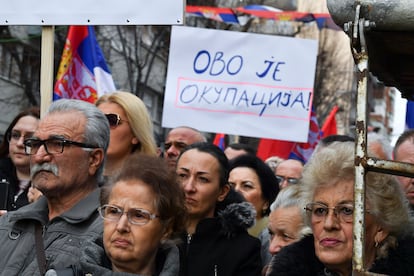Thousands of minority Serbs protest Kosovo’s decision to abolish the Serbian dinar
The government of Kosovo, a former Serbian province, banned banks and other financial institutions in the Serb-populated areas from using the dinar in local transactions, starting Feb. 1, and imposed the euro

Thousands of minority Serbs in Kosovo on Monday protested a ban on the use of the Serbian currency in areas where they live, an issue that is provoking the latest crisis in relations between Serbia and Kosovo.
Tensions escalated after the government of Kosovo, a former Serbian province, banned banks and other financial institutions in the Serb-populated areas from using the dinar in local transactions, starting Feb. 1, and imposed the euro.
The dinar was widely used in ethnic Serbian-dominated areas, especially in Kosovo’s north, to pay pensions and salaries to staff in Serbian-run institutions, including schools and hospitals.
The ban has angered both Kosovo Serbs and Serbia, and has fueled Western concerns about tensions in the region. The leaders of Serbia and Kosovo sparred over the issue at a meeting last week at the United Nations Security Council.
On Monday, apparently responding to international pressure, Kosovo’s Central Bank said it was extending a transition period for the currency rules from one to three months, and that it would simplify necessary procedures for both financial institutions and individuals.
Protesters at the rally in the Serb part of the divided northern Kosovo town of Mitrovica said that abolishing the dinar violates the rights of the Serbs in Kosovo and is discriminatory. They urged the international community to put pressure on the Kosovo government to reverse the move.
“This virtually means taking away food from our tables,” said Dusanka Djorovic, from a local pensioners’ association.
Dragisa Milovic, a doctor, said that Kosovo’s decision “is aimed at abolishing Serb institutions in these areas.”
In Pristina, Kosovo’s Prime Minister Albin Kurti dismissed such criticism in a message to the Kosovo Serbs. Kurti insisted that the new measure is aimed at curbing illegal money flow and “does not stop Serbia from financially assisting the citizens of Kosovo’s Serb community.”
“Kosovo did not stop the dinar, or the dollar, pound, or Swiss franc,” said Kurti. “The only change from Feb. 1 is that the cash cannot cross the border in sacks ... but should come through bank accounts and (be) withdrawn in euros.”
In 1999, a 78-day NATO bombing campaign ended a war between Serbian government forces and ethnic Albanian separatists in Kosovo. Serbian forces were pushed out but Belgrade never recognized Kosovo’s independence and still considers it a Serbian province.
The European Union and the United States have expressed concern that Kosovo’s ban of the dinar could raise tensions in an already volatile region and called for consultations and a delay in the ban.
The EU has brokered negotiations between Serbia and Kosovo in a bid to normalize their relations but the talks have showed slow progress while occasional violent incidents have fuelled fears of instability in the Balkans as the war rages in Ukraine.
Sign up for our weekly newsletter to get more English-language news coverage from EL PAÍS USA Edition
Tu suscripción se está usando en otro dispositivo
¿Quieres añadir otro usuario a tu suscripción?
Si continúas leyendo en este dispositivo, no se podrá leer en el otro.
FlechaTu suscripción se está usando en otro dispositivo y solo puedes acceder a EL PAÍS desde un dispositivo a la vez.
Si quieres compartir tu cuenta, cambia tu suscripción a la modalidad Premium, así podrás añadir otro usuario. Cada uno accederá con su propia cuenta de email, lo que os permitirá personalizar vuestra experiencia en EL PAÍS.
¿Tienes una suscripción de empresa? Accede aquí para contratar más cuentas.
En el caso de no saber quién está usando tu cuenta, te recomendamos cambiar tu contraseña aquí.
Si decides continuar compartiendo tu cuenta, este mensaje se mostrará en tu dispositivo y en el de la otra persona que está usando tu cuenta de forma indefinida, afectando a tu experiencia de lectura. Puedes consultar aquí los términos y condiciones de la suscripción digital.








































